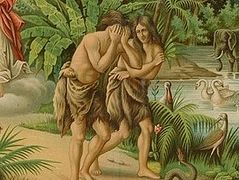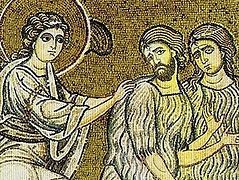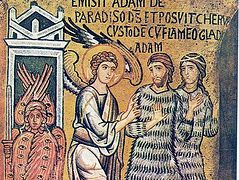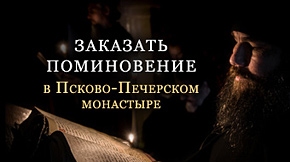In the name of the Father, and the Son, and the Holy Spirit!
The events that we remember today determined very much in the life of all humankind and for each of us. Adam’s exile, his exile from Paradise, is what the Church calls that terrible event. It relates directly also to us, and to our very close relatives—Adam and Eve. They truly are closely related to us—after all, their blood flows in our veins. Each of us has them as his ancestors. From them came the whole human race, and all the peoples of the world.
Back then, very long ago, something happened that caused a complete change in the life of all mankind—the fall into sin and the subsequent exile from the place our Heavenly Father, the Lord God, had originally appointed the entire human race to live, perfect itself, and ascend to God. In the Bible this beautiful place is called Eden. It was located on the territory of today’s Iraq, between the Tigris and the Euphrates. It is from there that our ancestors Adam and Eve were supposed to fill the whole world with their offspring.
But something happened that was—I wanted to say, “irreversible”, but no, it is not irreversible but it is a terrible and tragic event in the history of the family of man throughout the world. Adam was created free; as the image and likeness of God he could choose the path of life he considered best. This was either the path offered to him by God—the path of filial, grateful obedience proceeding from trust, love, and the contemplation of divine beauty and the beauty of the primordial world, is indescribable in human words. This was the path of striving for God.
But there was also something else. It was also obedience—because youthful man could not but be in the disciple stage—but obedience to a deceiver, a murderer and evil-doer, the devil.
The Lord God bestowed free will upon Adam, as He also has upon you and me. This is a very great but also very responsible gift. As a test of free will, as a confirmation of faithfulness to the Father, in Paradise grew the tree of the knowledge of good and evil. Of course it was also intended for man, but the Lord foretold that the time had not yet come for young Adam to know about good and evil. He was not strong enough yet, had not achieved perfection, and therefore if he were to eat of that tree he would die.
Adam lived in a world of divine perfection, in communion with his Father and Creator, and really did not know anything about an incomparably lower word—about another, as we now understand, variation in the development of human history, where alongside the good would triumph evil, sickness, sorrow, injustice, deceit, and suffering.
Satan, the devil, offered him and his wife: If you eat of this tree you will be like gods. Immediately! And Adam in fact had that goal, to be like God. He was created in the image and likeness of God, and in perfecting himself he was going in that very direction. But satan said, “Why wait? Do it now. Eat of the forbidden fruit and you will immediately be like god!” The heirs to that temptation and falsehood are right next to us now. When you regrettably look at the television you will without fail see a production that is called advertising. They tell you, “Take this pill and you will lose weight today,” or, “Buy this and you’ll be healthy right away,” “And if you take this pill you’ll be suddenly young again.” It’s a trick, and of course everyone knows it. But how many people fall for it!
Well, if we can put it this way, our forefather and mother fell for that same vulgar advertisement—“Eat it and you will be like gods!” There is nothing new under the sun.
But then in Eden happened something that was of course incomparably more that that. People not only not only disobeyed God, they chose, be it rashly or be it unthinkingly, but they chose the most terrible path that can possibly be imagined on this earth—opposition to the will of God. And what in this world can go against God’s will? Nothing—it’s impossible to go against the will of God! Going against the will of the All-Sovereign, Almighty God is death. And that is what our ancestors, our fore-parents Adam and Eve condemned us to: death.
The devil knew very well about this; he himself was already in a state of eternal death, eternal corruption and evil, and therefore his main goal was to draw the first people and the entire future race of man into his death.
But contrary to the fallen spirits, goodness remained in the human soul. Goodness no longer exists with the fallen spirits. There are completely dedicated to evil, to opposing God. Goodness remained in man even after the fall, but opposition to it and evil were introduced into our essence. The apostle Paul in his Epistle to the Romans says, “I am a wretched man; the good that I want to do, I can’t do, I don’t have the strength for it or the will; although I understand with my mind that I love and want to do good. But my passions and my flesh dispose me toward doing the evil that I do not want to do” (cf. Rom. 7:15–24).
So, people should inevitably have perished, crashed to their death against the crag of resisting God’s will. But the Lord, who desires that all should be saved and come to the knowledge of the truth, out of His infinite love for man whom He created, for the future human race, for each of us (after all, the Lord having created Adam, in His omnipotence and omniscience also created and loved all of his multitudinous descendants), chose a different path for people. Although it was was long, difficult path, it was the mankind’s salvation from eternal death. How did this salvation begin?
In the Bible we read that the Lord clothed them in garments of skin and cast them out of Paradise. What is this? How should we understand this “exile from Paradise?” Well, that is just how our salvation began. But what are the “garments of skin?” Just lower your eyes and take a look at yourselves. Our body is that very garment. Man’s current body is completely different from that subtle spiritual body in which the first Adam was clothed, as the holy fathers of our Church write. And now let’s take a look at our souls… We will see them filled with passions and sins. As it turns out, our physical and spiritual countenance is that very state of “exile from Paradise”. But when man was in Paradise he had a completely different body and a different, undamaged soul.
Yes, we know very well what “exile from Paradise” is! “You will eat your bread in sorrows, in the sweat of your brow.” Of course, human life is a great happiness, but those of the middle and older generations know that until the age of 45 – 50 man lives by labors, sweat, and sorrows, and then begin sicknesses, the problems of old age, death pangs and then death itself… Sometimes younger people get sick and die… But whatever the case, man departs from this temporary life into unfathomable and terrifying death. Earth thou art, and unto earth shalt thou return. The many complications, problems, and hardships that man has to experience in this life are inescapable for each person. And all of this is “exile from Paradise”. Only in our youthful and completely unreasonable age do we flatter ourselves with the hope that all of life will be cloudless for just for us; that we will manage to live in a completely different way. But later, if we are religious people, we’ll remember the words of the Psalmist: As for man his days are as the grass; as a flower of the field, so shall he blossom forth (Ps. 102:13). Labor and sorrows are the lot of the exile. It is no accident that we pray at the ectenias, the Liturgy, and the Vigil service “for the sick, the suffering, and captives and for their salvation. That we may be delivered from all sorrows, wrath, and necessity…” and so on.
When Adam let the spirit of rebellion into his heart, the spirit of the devil, he could no longer live as he did before the face of God. This duplicity, this communion with the devil and death simply began to tear him apart. Remember, in the Bible is described how after Adam and Eve had tasted of the fruit of the tree of the knowledge of good and evil, they literally broke their heads running and hiding when they heard the voice of God. They could not bear the presence of God, and essentially cast their own selves out of Paradise before the Lord God exiled Adam from the Garden of Eden.
The Lord sent man, His creation, on a long road with one aim—to save him from eternal death. And He Himself, in the person of His only Son of one essence with the Father, our Lord Jesus Christ, also sets off on the road to meet the that prodigal son, so that albeit not right away, perhaps after a long time, at the price of the Lord Jesus Christ’s suffering and death—that is of His own Self—to bring that salvation to completion.
This is what we are remembering today. In the hymns at the Vigil we sing: Adam sat outside of paradise and wept over his fall, weeping with belated tears. Each one of us has also had no few incidents after Adam when we have had to weep over our sins. However, fortunately we see how the Lord Himself in his mercy turns even these sins to our salvation. And the Lord God uses the very falls of mankind themselves for man’s repentance and transformation. Adam of course wept not just for himself alone but for his multitudinous descendants, amongst whom are you and me. He saw to what he had condemned billions of people, and that not all of them, not even thanks to the Lord Jesus Christ’s sacrifice on the Cross, will be saved.
To this ancient and yet personal history that is repeated with each one of us, in our own personal fate, the Holy Church returns on the eve of Great Lent. Our entrance into fasting and repentance begins from this point of the fall into sin when we cast our own selves out of Paradise and into our common grievous, fallen state.
We will yet talk much more about the fast, about how to pass through it profitably. But today we read the Gospel where in simple words it spoke of how if we forgive our neighbor his sins with all our heart, then the Lord will forgive us. This is a simple, perhaps some one might even say, ABCs kind of sermon. Yes, it is simple, that’s true. But this commandment is divine. Just look—the Lord demands very much from us, He invites us to do something that each one of us is capable of doing—forgive with all our heart, and by this to be like God. The Lord out of His mercy forgives each person who repents of any sin.
Also in today’s Gospel we heard: Do not gather treasures on earth, treasures for our garments of skin, which get sick and old, torment us and are tormented themselves over the whole course of our lives. Do not gather treasures for them—gather treasures there, in Eden, in that country of which we really are the heirs but have simply forgotten about it our didn’t know. In that country out of which our ancestors where exiled but where we are intended to settle. And not only in Eden, but in the infinitely more perfect than Eden New Jerusalem, as it is called in the New Testament. Each person who makes the effort should return not only to the original state before fall, but even more, should become the heir of God Himself. This is what the Lord God created man for. It is no accident that Adam was tempted by the promise to become “like god”. For this is after all God’s aim for man—to raise each one filled with faith in Christ to infinite divinity. This is the very goal of creation.
We can’t say everything about this all at once. But Great Lent is a marvelously convenient time to delve into the questions of spiritual life. Let us labor, make an effort to gain knowledge, to repent, and to change our lives, for the salvation of our souls and to unite with God; to correct our errors to the best of our ability, and through this, to at least some extent correct the error of our Forefather.
This evening will be the rite of forgiveness at what will already be Great Lenten Vespers. Each of us should spend Great Lent according the rule of the Church. But if anyone is sick or infirmities do not allow you to keep the entire rule, then you should go to a priest and ask his advice. Perhaps he will give some a special blessing for relaxation of the fast, but this should not proceed from faintheartedness or fearfulness, only from a real state of health and ability related to this labor. The goal of the fast is not the harsh fulfillment of the rules, but rather the struggle with our passions. It is to cast the spirit of resistance out of our souls—that same spirit that entered into us in Eden.
We will be serving the Passion service on Sunday evenings this Lent beginning from the second Sunday. The Liturgy of the Presanctified Gifts will be served each Wednesday and Friday. I will remind you that the first Liturgies of the Presanctified Gifts during the coming week are intended for the sick. Not everyone should receive Communion on those days, but only those who unable to fast strictly until Saturday. But those Orthodox Christians who are healthy and able to fast strictly until Friday may go to confession on Friday, and the whole Orthodox world receives Holy Communion on Saturday and Sunday. I will remind you once again that that the first week of Great Lent is a time designated for very strict fasting, repentance, and preparation for Communion. In ancient times, only very ailing people fasted only the first two days, and received Communion on the third, because they were simply physically unable to fast until Friday. It was for them that the Liturgy of the Presanctified Gifts was instituted on Wednesday. But if you are able to stand through seven hours of services each day for a week, and at home to read five kathismas of the Psalter and all the canons and rule before Communion, then thank God for your excellent health and dedicate this week to nothing other than repentance. Receive Communion at the Liturgy of St. John Chrysostom or St. Basil the Great [on Saturday or Sunday]. Then next week, any of you can receive Communion at the Liturgy of the Presanctified Gifts.
Greetings with the feast! Greetings with the beginning of Great Lent!
May the Lord save you!







